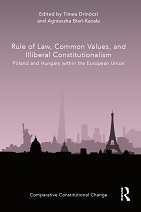edited by Tímea Drinóczi, Agnieszka Bień-Kacała (Routledge May 2020, 260 pages)
About the book
This book challenges the idea that the Rule of Law is still a universal European value given its relatively rapid deterioration in Hungary and Poland, and the apparent inability of the European institutions to adequately address the illiberalization of these Member States.
The book begins from the general presumption that the Rule of Law, since its emergence, has been a universal European value, a political ideal and legal conception. It also acknowledges that the EU has been struggling in the area of value enforcement, even if the necessary mechanisms are available and, given an innovative outlook and more political commitment, could be successfully used. The authors appreciate the different approaches toward the Rule of Law, both as a concept and as a measurable indicator, and while addressing the core question of the volume, widely rely on them. Ultimately, the book provides a snapshot of how the Rule of Law ideal has been dismantled and offers a theory of the Rule of Law in illiberal constitutionalism. It discusses why voters keep illiberal populist leaders in power when they are undeniably acting contrary to the Rule of Law ideal.
The book will be of interest to academics and researchers engaged with the foundational questions of constitutionalism. The structure and nature of the subject matter covered ensure that the book will be a useful addition for comparative and national constitutional law classes. It will also appeal to legal practitioners wondering about the boundaries of the Rule of Law.
About the series
Comparative Constitutional Change has developed into a distinct field of constitutional law. It encompasses the study of constitutions through the way they change and covers a wide scope of topics and methodologies. Books in this series include work on developments in the functions of the constitution, the organization of powers and the protection of rights, as well as research that focuses on formal amendment rules and the relation between constituent and constituted power. The series includes comparative approaches along with books that focus on single jurisdictions, and brings together research monographs and edited collections which allow the expression of different schools of thought. While the focus is primarily on law, where relevant the series may also include political science, historical, philosophical and empirical approaches that explore constitutional change.
